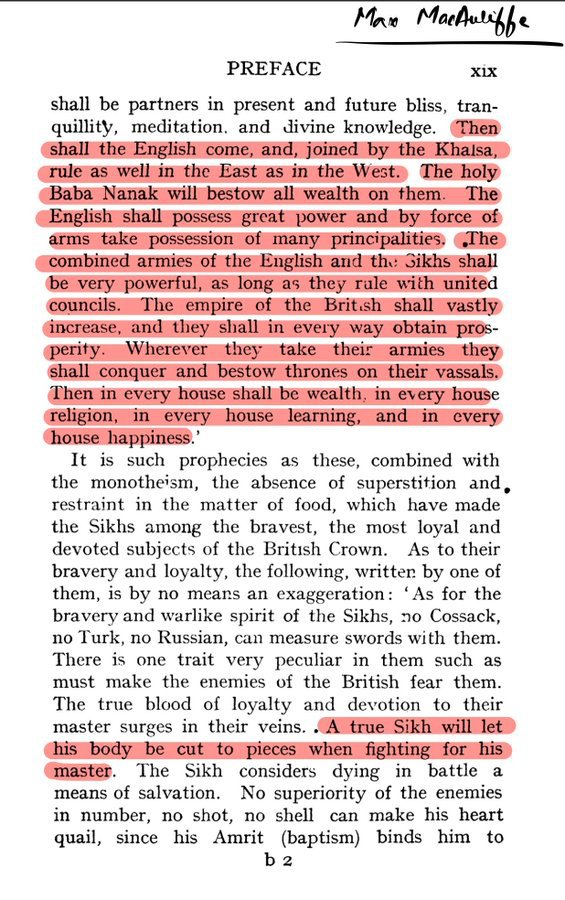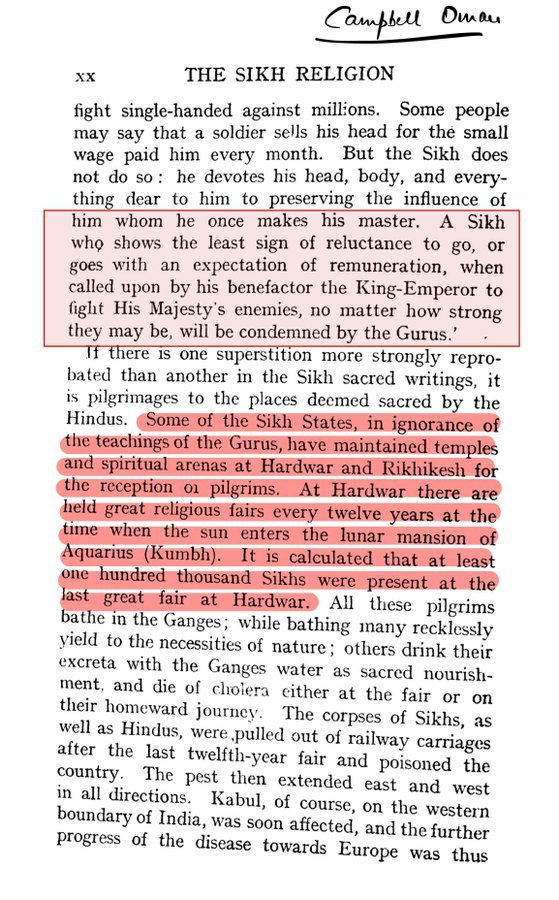The Khalistani movement advocates for a separate Sikh homeland. However, this is not merely a contemporary political issue supported by foreign-aided militants. It is a historical construct rooted deeply in British colonial strategy.
The British, adept at the “divide and rule” policy, meticulously sowed the seeds of separatism among Bharat’s diverse communities. This strategy played a pivotal role in the genesis of the Khalistani identity. Even today this ideology influences the Khalistani movement, the political landscape of Punjab, and the broader Sikh diaspora. Let’s explore!
Max Arthur Macauliffe And The Khalistani Mindset

The British colonial administration employed various tactics to create divisions within Indian society. They relentlessly schemed to combat the united force of Sanatani warriors in India. A crucial figure in this narrative manipulation was Max Arthur Macauliffe. As a British civil servant stationed in India, Macauliffe presented his English-translated version of the Sikh holy scriptures. Analysts state that his translation was not a mere scholarly endeavor. It served a strategic purpose – highlight and exaggerate the distinctions between Sikhs and Hindus.
Macauliffe’s deliberate overemphasis on religious differences was a cornerstone of the British strategy to prevent a unified Indian identity from emerging.

Some believe that Macauliffe also assisted the British in offering political patronage to Sikhs and reinforcing a sense of exclusivity. They branded Sikhs as a “martial race” and recruited them in large numbers into the British Indian Army. This preferential treatment created a sense of distinctiveness among Sikhs. And so began the alienation of the Sikhs from Hindu identity. Thereby, fostering a nascent separatist sentiment and creating rifts between Sikhs and Hindus. The ultimate aim of the British was to weaken any potential unified Hindu resistance against their rule.
The Khalistan Dream – A Post-Colonial Legacy Aided By Western Sympathies

The legacy of British manipulation endures to date. Sections of the Western political elite still exhibit sympathy for the Khalistani cause. A recent UK government review highlighted the rise of “pro-Khalistan extremism” within the UK’s Sikh communities. This report underscores the enduring impact of British colonial policies on contemporary politics.
Trudeau’s Canada and its politics are completely colored by the Khalistani Cause.

The persecution of Hindus in Canada under the Khalistani influence has become obvious and blatantly shameless. The US also protects the Pro-Khalistani elements like Pannun in its region. These extremists are given safe passage and protection by the West to perpetuate a false narrative of Sikh persecution in India. This narrative, devoid of factual accuracy, serves as a recruitment tool, employing misinformation to garner support for their separatist agenda.
Crackdowns On Sikhs And Its Repercussions

The Indian government, throughout the 1980s and early 1990s, conducted extensive crackdowns on Khalistani sympathizers in Punjab and across the country. Ex: Operation Blue Star! These measures, aimed at curbing the separatist movement, were often extreme in nature. Thus, the crackdown, while necessary to maintain national integrity, also alienated sections of the Sikh community, perpetuating a cycle of violence and resentment.
Therefore, the Pro-Khalistani elements in the West use these hurt sentiments to create dissent in Bharat. They utilize sophisticated misinformation techniques, a form of fifth-generation warfare, to further their cause.
Consequently, they perpetuate the idea of Khalistan only in India.
Not a single Khalistani is seen asking for Pakistan’s Punjab region.
Sikhs run to Bharat when faced with Islamist prosecution in Pakistan and Afghanistan but the Khalistnis sympathizers side with narratives of a separate Sikh state under India’s protection. The fake persecution, the radicalization of Sikh youths, and the narco politics of India’s Punjab have made it a problem state in today’s Bharat.
Points to Ponder
The Khalistani identity is rooted in British colonial strategy.
The ‘Divide and Rule’ to imperialist policies has colored any conversation on Sikhism with separatist identity. The British, exemplified by figures like Max Arthur Macauliffe, planted the seeds of separatism among Sikhs. The idea of Khalistan and anti-Hindu sentiments are sponsored by the West to ensure that Bharat stays destabilized.
Unfortunately, all the national parties of India have been unable to counter this belief. Instead, parties like AAP have fueled this ideology by empowering the Khalistani section of Punjabi society. Thus, the legacy of Macauliffe coupled with modern campaigns is the genesis of Punjab’s extremism. Additionally, this mindset continues to shape the socio-political dynamics of Punjab and the global Sikh diaspora.
With each passing election cycle, people like Amritpal are arming the narco-gangs of Punjab and ensuring that it heads to the point of no return in terms of extremism and militancy! The answer to this problem lies in the hands of the people of Punjab. They need to urgently arm themselves with correct knowledge and facts about their history and identity. Punjabis and Sikhs need to use facts to counter the colonial narrative that still lives thanks to Western policies. Let’s hope the people of Punjab uncover their roots in Sanatana Dharma and the ugly truth of the Khalistani mindset!


